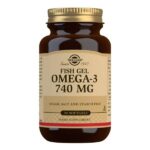





Fish Gel Omega-3 740mg Softgels Solgar
£33.95 Original price was: £33.95.£27.06Current price is: £27.06.
Fish Gel Omega-3
Solgar Fish Gel Omega-3 fatty acids are a group of essential fats that play crucial roles in various bodily functions. There are three main types of omega3 fatty acids: alpha-linolenic acid (ALA), eicosapentaenoic acid (EPA), and docosahexaenoic acid (DHA).
These fatty acids are primarily found in certain fish, seafood, flaxseed, chia seeds, walnuts, and algae. Here are some potential benefits associated with omega-3 fatty acids:
1. **Heart Health:**
– **Reduced Risk of Heart Disease:** Omega-3 fatty acids have been shown to lower triglycerides, reduce blood pressure, and improve overall heart health.
Regular consumption is associated with a decreased risk of heart disease.
– **Anti-Inflammatory Effects:** Omega-3s help reduce inflammation, a key factor in the development of heart disease.
2. **Brain Health:**
– **Cognitive Function:** DHA, one of the omega-3 fatty acids, is a major component of the brain. Adequate intake may support cognitive function and may play a role in preventing age-related cognitive decline.
– **Mood and Mental Health:** Omega-3s may have antidepressant and mood-stabilizing effects. They are being studied for their potential role in managing conditions like depression and anxiety.
3. **Eye Health:**
– **Reduced Risk of Macular Degeneration:** Omega-3s, particularly DHA, contribute to eye health and may reduce the risk of age-related macular degeneration (AMD), a leading cause of vision loss.
4. **Inflammation and Joint Health:**
– **Anti-Inflammatory Properties:** Omega-3s help reduce inflammation in the body, which can be beneficial for individuals with inflammatory conditions such as rheumatoid arthritis or joint pain.
5. **Skin Health:**
– **Moisture and Elasticity:** Omega-3 fatty acids help maintain skin moisture and elasticity. They may also have anti-inflammatory effects, benefiting conditions like eczema and psoriasis.
6. **Pregnancy and Fetal Development:**
– **Brain and Vision Development:** Omega-3s, especially DHA, are crucial during pregnancy for the development of the fetal brain and eyes. Adequate intake may also contribute to a reduced risk of preterm birth.
7. **Improved Lipid Profile:**
– **Increased HDL Cholesterol:** Omega-3s may help raise levels of high-density lipoprotein (HDL) cholesterol, often referred to as “good” cholesterol.
8. **Reduced Inflammation:**
– **Inflammatory Diseases:** Omega-3s have anti-inflammatory effects and may be beneficial in managing chronic inflammatory diseases such as inflammatory bowel disease (IBD) and psoriasis.
9. **Reduced Risk of Certain Cancers:**
– **Colon and Breast Cancer:** Some studies suggest that omega-3 fatty acids may play a role in reducing the risk of certain types of cancer, including colorectal and breast cancer.
10. **Improved Metabolic Health:**
– **Insulin Sensitivity:** Omega-3s may improve insulin sensitivity, making them potentially beneficial for individuals with type 2 diabetes.
It’s important to note that while omega-3 fatty acids offer various health benefits, they should be obtained through a balanced and varied diet.
If dietary intake is insufficient, omega-3 supplements, such as fish oil or algal oil capsules, can be considered, but it’s recommended to consult with a healthcare professional before starting any supplementation.
Individual responses to omega-3 supplementation may vary, and excessive intake of certain forms of omega-3s, particularly through supplements, should be avoided without professional guidance.

















Reviews
There are no reviews yet.